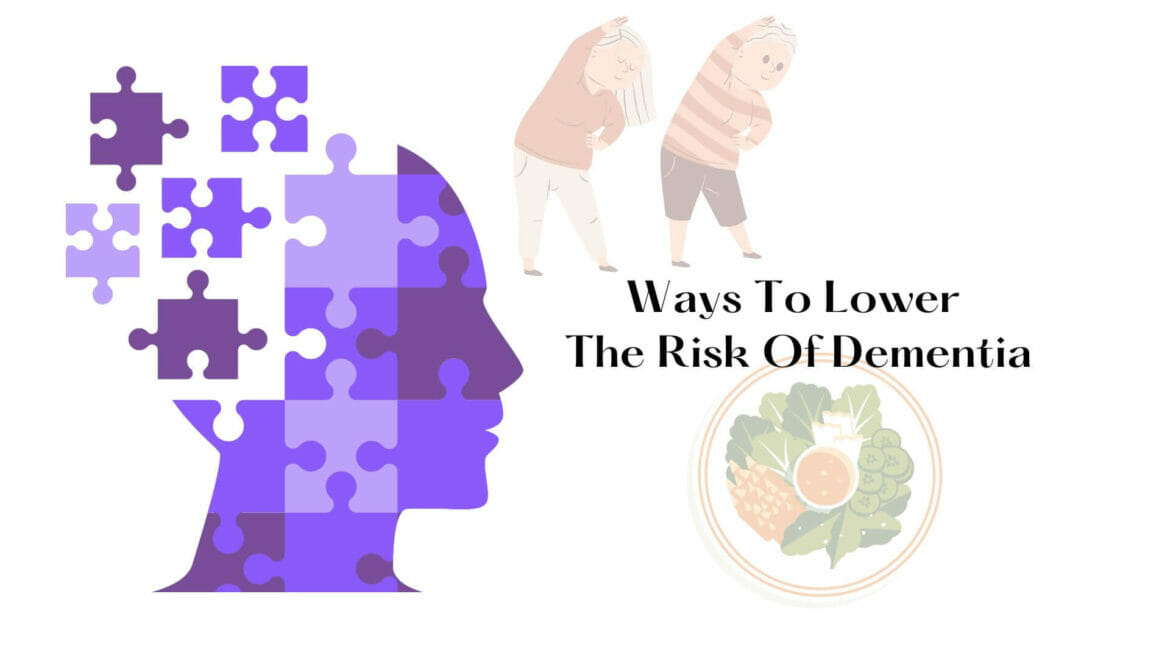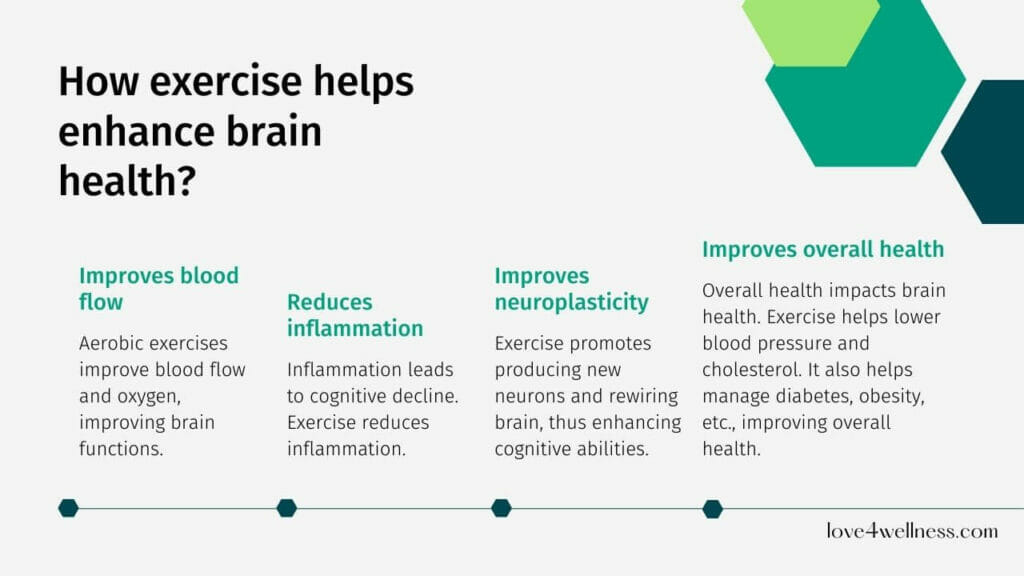Dementia is a condition affecting millions of people worldwide, and it can have a devastating impact on individuals and their families. Presently there is no cure for dementia. However, there are ways to lower the risk of developing the condition. Many of these involve lifestyle changes that can improve overall health and well-being. Moreover, adopting a healthy lifestyle and protecting brain health while young will help lower the risk of developing dementia and help you enjoy a better quality of life in later years. This article explores effective ways to reduce dementia risk and help you achieve a healthier and happier future.
Quick pointers to reduce Dementia risk
- Manage blood sugar
- Manage healthy levels of blood cholesterol
- Manage healthy weight
- Control high blood pressure
- Choose healthy fats, complex carbs, and quality protein
- Include a lot of colourful vegetables and fruits (at least five servings per day)
- Limit sugar and salt
- Exercise regularly
- Have good sleep habits
- Manage stress with yoga and other de-stressing activities
- Engage in activities stimulating the brain, such as playing sudoku, painting, learning a new language, etc.
- Quit smoking
- Limit alcohol to 14 units per week
What is dementia?
Dementia is a syndrome that affects cognitive functions of the brain, including memory, thinking, and reasoning. It is a progressive condition that typically occurs in older adults but can also affect younger individuals.
Symptoms
Dementia can significantly impact a person’s ability to carry out daily activities and communicate with others. The symptoms of dementia include,
- memory loss
- difficulty concentrating
- finding it hard to do familiar tasks, such as getting confused over the exact change while shopping
- difficulty with language; struggling to follow a conversation or problem in finding the right word
- Confused about place or time
- personality changes, usually noticeable by others
- a decline in reasoning and judgment
Who is at more risk?
Various risk factors can increase a person’s likelihood of developing dementia. Age is the most significant risk factor, as the risk of developing dementia increases significantly as we age. Other risk factors include:
- Genetics and family history: Certain genes have been linked to an increased risk of developing dementia, including the APOE gene. In addition, a family history of dementia is a significant risk factor for dementia.
- Lifestyle factors: Poor diet, lack of physical activities, smoking, and excessive alcohol consumption are all linked to an increased risk of dementia.
- Cardiovascular markers: High blood pressure and blood lipids (Cholesterol and Triglycerides) are important markers increasing the risk of dementia.
- Chronic inflammation-induced diseases: Chronic inflammation causes many conditions, including diabetes mellitus and obesity. Increased evidence suggests a higher risk of dementia in people with inflammation-induced disorders.
- Head injuries: Repeated head injuries or a single severe head injury can increase the risk of dementia.
Natural ways to lower dementia risk
Repeatedly recommending a good lifestyle to avert diseases may bore you, but it is a simple truth! Many diseases prevalent in this century are caused by poor lifestyles, and hence managing them lies in adopting a healthy lifestyle.
The following are ways recommended by experts to lower your risk of dementia.
1. Regular exercise helps in several ways
Many studies show that exercise provides numerous benefits for brain health, including reducing the risk of dementia.
- Exercises such as aerobic exercise improve blood flow and oxygen to the brain and enhance brain functions.
- Chronic inflammation negatively impacts cognitive functions. Exercise helps reduce inflammation and hence can lower the risk of cognitive decline.
- Neuroplasticity is the ability of the brain to develop new neurons and adapt to further information. Exercise significantly increases new neurons, thus enhancing brain functions.
- Cardiovascular health is important for brain health. Important health markers such as blood pressure and cholesterol are directly linked to a decline in cognitive functions. Since exercise lowers high blood pressure and reduces cholesterol levels, it helps in improving brain health.
- Chronic diseases such as diabetes and obesity also negatively impact brain health. Exercise helps improve overall health, thereby improving brain health as well.
2. A Healthy diet is important
A poor diet comprising a lot of processed foods high in sugar, salt, and unhealthy fats affects brain health hugely, increasing the risk of dementia. Hence, eating healthful food that improves your body’s and brain’s health is important.
- Anti-inflammatory foods: Since inflammation increases dementia risk, including foods such as green leafy vegetables, berries, fatty fish, and nuts that have excellent anti-inflammatory properties are hugely beneficial.
- Antioxidants: Antioxidants, particularly lutein, zeaxanthin, and beta-cryptoxanthin, are potential carotenoids that can help prevent dementia. Green leafy vegetables, broccoli, asparagus, spinach, and peas are good sources of lutein and zeaxanthin. Furthermore, orange-coloured fruits, such as mango, orange, papaya, peach, pumpkin, etc., are rich in beta-cryptoxanthin.
- Omega-3 fatty acids: These healthy fats found in fatty fish such as tuna and salmon have protective effects on the brain and lower the risk of dementia.
- Avoid unhealthy fats and sugar: A high intake of saturated and trans fats and sugary foods increases your risk of cognitive decline. Hence, limiting such unhealthy fats and sugar help lower dementia risk.
A study published in BMC journal found that the Mediterranean diet reduced dementia risk by 23%. A Mediterranean diet comprises complex carbs, high-quality proteins, and heart-healthy fats. In addition, they are rich in antioxidants and omega-3 and omega-6 fats that reduce inflammation. The Mediterranean diet, containing fruits, vegetables, whole grains, nuts, fish, and olive oil, has long been associated with a reduced risk of dementia.
So if you have a higher risk of dementia, such as a family history of dementia or chronic diseases such as diabetes and heart disease, you must consider switching to a Mediterranean diet, which has many complementing factors for brain health.
Recommended reads:
- Eight Medicinal And Health Benefits Of Heart-Healthy Olive Oil
- Who Is Mediterranean Diet For? Key Components And Health Benefits
3. Engage in activities involving the brain
Activities that engage your brain have beneficial effects on brain health. For example, the simple habit of reading for 10 minutes every day positively impacts your brain health.
Other activities to boost brain health and reduce dementia risk are:
- Journaling the day’s events
- Maintaining your accounts
- Playing games like sudoku and crosswords
- Learning a new skill, such as a foreign language, a musical instrument, etc.
- Engaging in creative activities, such as drawing and painting
4. Sleeping well is important
Sleep may look trivial, but many important things go on while you sleep, including those important for brain health.
For example,
- The brain flushes out toxins, including beta-amyloid proteins, when you sleep. Poor sleep interferes with this process leading to a build-up of β-amyloid plaque, a key aspect of Alzheimer’s.
- It is during sleep that your brain cells are repaired and regenerated. Also, memories and new information are consolidated during sleep. Therefore, with poor sleep habits, there is a higher risk of cognitive decline and memory problems.
- Sleep deprivation also leads to depression and anxiety, potential risk factors for cognitive decline.
You Might Also Like: Why Is Learning A New Language Good For Your Brain?
5. Reduce alcohol intake
Heavy drinking is certainly linked to dementia. Hence, men and women should limit alcohol intake to 14 units per week. Also, if you are a regular drinker, spread your consumption over three or four days.
6. Stop smoking
Smoking definitely increases the risk of cognitive decline. However, your dementia risk lowers to non-smokers if you quit smoking.
The bottom line
Adopting a healthy lifestyle, which includes regular exercise, a balanced diet, and good sleep habits, can help reduce the risk of cognitive decline. Staying socially active and engaging in mentally stimulating activities, such as reading, playing games, and learning new skills, can also help keep the brain healthy. Additionally, managing chronic conditions like high blood pressure and diabetes can help lower the risk of developing dementia. By including these strategies in your daily routine, you can protect your brain health and also lower your risk of developing dementia.
Images: canva.com



